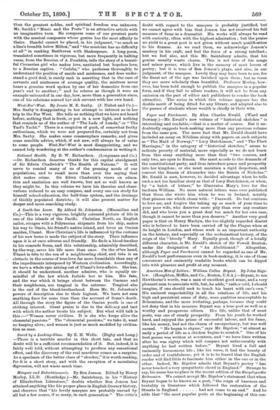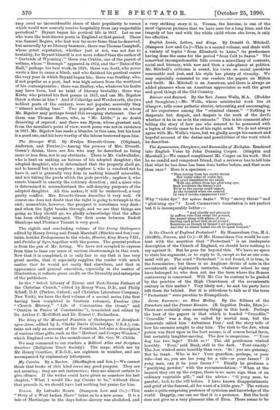American Men of Letters : William Cullen Bryant. By John
Bige- low. (Houghton, Mifflin, and Co., Boston, U.S.A.) —Bryant, to use Hawthorn's words, was a man of excellent good sense, and a very pleasant man to associate with, but, he adds," rather cold, I should imagine, if one should seek to touch his heart with one's own." His eminent respectability in all the relations of life, and his high and persistent sense of duty, were qualities unacceptable to Bohemians, and the more irritating, perhaps, because they could not deny that in his measure Bryant was a true poet as well as a worthy and prosperous citizen. His life, unlike that of most poets, was one of steady prosperity. From his youth he worked hard, and enjoyed the prizes of successful labour, and his fame, like his money, had not the charm of unexpectancy, but was well earned. " He began to rhyme," says Mr. Bigelow, " at almost as early a period of life as a chicken begins to scratch." One of his best poems was written at seventeen, and "we have lines written after he was eighty which will compare not unfavourably with anything he had written before." Bryant lived a full and eminently harmonious life ; like his verse, it had the beauty of order and of truthfulness; yet it is to be feared that the English reader will find little to fascinate him either in the one or in the other. Indeed, Mr. Bigelow admits that Bryant's poetry " has never touched a very sympathetic chord in England." Strange to say, his name has no place in the recent edition of the Encyclopaedia Britaanica. We cannot accept Mr. Bigelow's statement that when Bryant began to be known as a poet, "the reign of baseness and brutality in literature which followed the restoration of the Stuarts in England had not come to an end." And he adds that "the most popular poets at the beginning of this con- tray owed no inconsiderable share of their popularity to verses which would now scarcely receive hospitality from any respectable periodical." Bryant began his poetical life in 1817. Let us see who were the best-known poets in England at that period. There was Samuel Rogers, who had won fax more fame than he deserved, but assuredly by no literary baseness; there was Thomas Campbell, whose great reputation, whether just or not, was not due to brutality, for Bryant himself is not more refined than the author of "Gertrude of Wyoming;" there was Crabbe, one of the purest of writers, whose " Borough " appeared in 1812, and the " Tales of the Hall," perhaps his best work, in 1819; there was Scott, who never wrote a line to cause a blush, and who finished his poetical career the very year in which Bryant began his ; there was Southey, who, if not popular as a poet, had won high esteem from the worthiest of his contemporaries ; there was Shelley, who, whatever his faults may have been, had no taint of literary brutality; there was Keats, who printed his first poems in 1817, and can Mr. Bigelow throw a stone at him P And if Coleridge and Wordsworth, the two noblest poets of the century, were not popular, assuredly they " uttered nothing base." Two popular poets remain on whom Mr. Bigelow may perhaps found this sweeping statement. One of them was Thomas Moore, who, as " Mr. Little." is no doubt deserving of reproof; and there was Byron, whose greatest and, from the moralist's point of view, worst poem was not in existence in 1817. Mr. Bigelow has made a blunder in this case, but his book is a good one, and his hero worthy of the labour bestowed upon him.







































 Previous page
Previous page